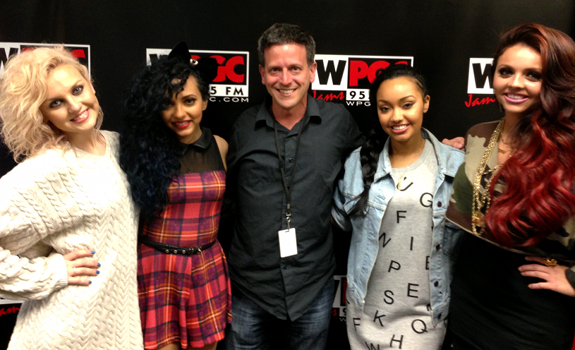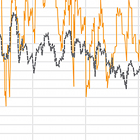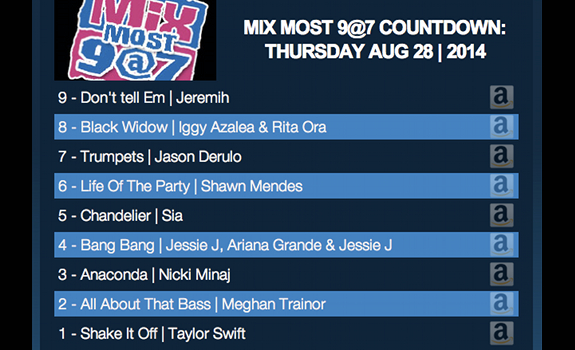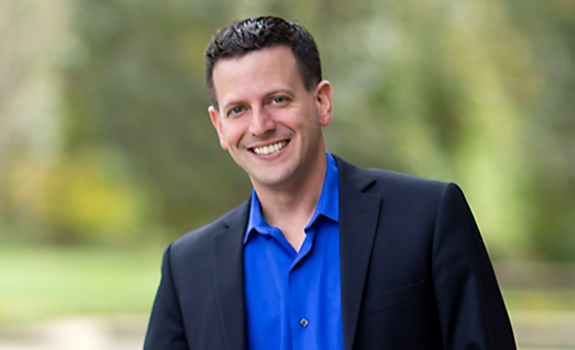While most programmers rotate a narrow playlist of top-testing songs, Jason Kidd puts passion first with his new ‘young Classic Hits’ variety format Smash Hits.
After working as an on-air talent and program director for 2 decades, Kidd started his own consultancy company New Generation Radio on a mission to revive radio ‘one station at a time’. We’ve had a good talk about PPM-friendly programming, innovative formats and more creativity. “We went too far with over-researching our radio stations.”
“Running all these stations
was very valuable”

Jason Kidd learned a lot from programming many stations in various markets with different formats (photo: WPGC)
Build a broad resume
Jason Kidd’s radio career begins in 1989 (when he is 16) as an intern at B-104 in Baltimore, MD. “At the time, it was one of the biggest CHR stations in America. We had Glenn Beck, who in those days was one of these ‘Top 40 Morning Zoo’ disc jockeys.” Starting with answering the phone for deejays, he can soon help out in the B-104 promotion, programming, production and research departments. “It was like my college education in this business.” He then has on air stints at several stations around the country, and works his way up from the graveyard shift to morning glory and afternoon drive, then specializes in programming. He becomes a PD for Clear Channel Media + Entertainment brands in New York and Pennsylvania, and CBS Radio stations in Texas, Baltimore and Washington, DC – including the iconic WPGC, DC’s Home of at Least 18 Jams in a Row. His goal is to gain experience in a variety of formats, from CHR and Urban to Hot AC and Adult Hits, also by scheduling some Sirius XM channels part-time, besides his PD jobs.
 Understand audience research methods
Understand audience research methods
“It was very good to broaden my resume and musical knowledge. Running all these stations and seeing how it coincides with the ratings, especially with the PPM measurement, was very valuable. During the last couple of years in my last job, I spent most of my time to study how the ratings system works. It’s a game. We may not like the game, but at the end of the day we’ve got to play it! There are ways to become very good at it and win.”
Get diary keeper credits
From what I heard, program flow is very important in PPM – much more than in diary markets?
“Yes. Diary was about recall; getting your logo out there. People were voting for you, basically. If they saw your name and heard people talking about you enough, that’s all they needed to write you down, even if they didn’t listen to you much. Some heritage stations would win based on recall; they were in the market forever and legendary. But that doesn’t necessarily mean that they did great radio. PPM is all about real time; people who are actually listening – or not listening – to your radio station.”
“Appointment listening is a very big part
of moving the needle in PPM”

Regular features, like a daily interactive countdown, work well for appointment listening in PPM (image: Mix 97.7)
Contact your research provider
What about people who are listening, but don’t carry a meter? How to cope with low sample rates?
“It’s a challenge. I have dealt with that in Washington, DC. There were nowhere near as many PPM devices out there than we expected. There were 500 or 600 in our demographic, in a market of 4 million people. So we always had to stay on Arbitron, now Nielsen, to make sure they’re correcting the sample. Many times we looked at monthly data, and could see they were way underperforming. I really wish the sample would be larger than it currently is. Careers depend on it! But at the end of the day, it is what it is [sighs]. You try to do the best you can with it.”
 Make listeners come back
Make listeners come back
What can we do to drive PPM ratings, apart from optimizing the program flow and creating more tune-in occasions?
“Appointment listening is a very big part of moving the needle in PPM. When teasing a story, we say: ‘More coming up in five minutes; that’s 8:05’. Give an exact time, as people do come back.”
Timestamp station & show content
Over the years, Jason Kidd has found that cash (and other) giveaways work really well in PPM, especially when they’re done several times a day, so listeners have a reason to come back again and again. It’s also good to have features at regular times. “Whether it’s a countdown every night, like a 9 @ 9, or anything else – as long as you timestamp it. Features like these have also worked back in the diary days, because they were memorable. People became passionate about them, so they wrote them down.”
“Marketing your radio station
is still very, very important”

Even if PPM is mainly about real-time results, radio stations should market their brand really well (photo: CBS Outdoor)
Reach a broad audience
Can we balance long-term brand values and short-term PPM programming?
“What I have learned over the last few years, is don’t program in the moment too much. The listeners that you have now [within your PPM panel] could be gone next month.” He explains that Nielsen is constantly bringing new participants in and taking others out of the sample, so it might be better to aim at your whole demographic. “If you just focus on a small group of people, you might be niching yourself too much. Be as broad as possible. Have in mind that you’re still catering to millions of people out there; not just 50 or 100. You can’t put all your eggs in your basket. You still have think: I’m talking to all these people who may not have meters right now, but maybe they will at some point.”
 Market in PPM zones
Market in PPM zones
Plus, you don’t know who these 50 or 100 individuals are, right?
“You don’t know a thing about them. You might know their zip code, but not how old they are, for example.” Kidd advises PDs to be careful with M Scores, weekly reports showing subscribers a PPM-related score for every song they played.
Promote your station & personalities
“You’ve got to make sure that you played a song enough, at least 3 weeks in a row, to see a trend before you make any decisions. If someone tunes out during a song, it could be somebody pulling up a grocery store and getting out of the car. Going back to your question: yes, there is a balance. If there’s something going on, people should be able to punch in your station and find out what it is – feel where they live, and what’s happening. I believe that marketing your radio station is still very, very important. It was big in diary, because of recall. It might be even bigger now. There’s a lot more competition today from all these music services.” He regrets that while many stations used to air TV commercials that make radio look cool (and personalities like rock stars), some operators have cut marketing budgets. “We have to get a lot better with promoting ourselves again.”
“We’ve got too caught up in the realness”
Hire authentic radio personalities
What about passion on the air? When I compare 80s & 90s radio airchecks from California Aircheck or Art Vuolo – even if that style is not completely relevant today – I do hear a lot of enthusiasm! I’m actually missing that soul on a lot of today’s radio.
“That was a lost art, even back before PPM got started. You’ve had a lot of big companies coming in and buying up stations, trying to do radio on the cheap with voicetracks from somewhere else. So we started to lose that magic; that sizzle which is responsible for getting all of us into the business in the first place. Back in those days, growing up listening to radio, you wondered: how are they doing this?? Although things are different today and it’s more about reality – talents should relate to listeners, and vice versa – we’ve got too caught up in the realness. While being real is good, there’s room to sprinkle this enigma about radio.”
 Offer a compelling alternative
Offer a compelling alternative
On many stations, I hear showbiz gossip and talk about ‘reality’ shows like the Kardashians. Maybe it’s time to start creating more creative radio again?
“Yes, that’s exactly what I’m hoping for. The real idea behind New Generation Radio is to inject passion and get people to listen to radio again.”
Aircheck external radio markets
After leaving his job at CBS, Kidd heard to a lot of radio while driving through several states on his way to visit friends and family. “I wanted to hear stations how they sound on a radio because online listening can be misleading. All I heard was the same 5 or 6 formats, over and over again; often same songs, over and over again. I heard voicetracks being played over the wrong songs; weather forecasts from the prior day, and all I could say was: man, we’re in a lot of trouble here. How did we get to this point?! I also knew there is a big hole for creating new formats; for trying to find the spark again.” The first result of that is Smash Hits, which could fall “under the Adult Hits umbrella” but is “a younger Classic Hits station”. Where most Oldies, Adult Hits, Classic Hits and Classic Rock stations play mainly Pop-Rock from the 60s, 70s & 80s, Smash Hits is focusing on 80s & 90s from a variety of music styles.
“Research is a very important tool,
but it’s just a small piece of the pie”

Instead of only playing a few hundred top-testing songs, radio may benefit from more variety (image: Iserotope)
Play some spice songs
I find your format demo refreshing. It includes many ‘wow’ songs – stuff I haven’t heard on the radio in ages – but as most competitors only spin top-testers, isn’t playing less-known music a risk?
“I don’t think so. For many years, we went too far with over-researching our radio stations. Research is a very important tool; I use it all the time with everything I do, but it’s really just a small piece of the pie. PPM has proven that variety is a major plus in the ratings.” Referring to the Jack FM format, he says that “some of these stations have done very, very well, and their libraries are in some cases over 1000-1200 songs”. (Kidd programmed Jack FM in Baltimore for about 5 years). “It’s about how you place these songs. You’re not running an entire hour of surprise songs; you sprinkle them in and get a big pay-off every time one plays. Some of these haven’t been played on air since they were hits. To hear these again on the radio is definitely a wow factor! There’s a lot of passion for this music, and I think it makes people excited to tune into radio again. And throughout the entire day, we don’t repeat a single song.”
 Let the music flow
Let the music flow
You call it a ‘PPM-friendly’ format. How do you try to achieve this, apart from music variety?
“It’s a fast-moving format. The imaging rolls over song intros, so that the music goes on, which is another must in PPM. You don’t stop the music, unless you have a commercial break. Some stations still play their sweepers in between songs, but we like that extra forward momentum.”
Analyze local airplay history
Are the music library and other format elements being customized for every market?
“They choose whether they want it live & local, or if they just want to run music and imaging. We certainly prefer live & local, but some stations are not able to do that. But when we launch it, regardless of whether they’re going to have personalities or not, we like to let the music play for the first couple of weeks. Before going into a new market, I go back and research what was played during the format’s music era in that market. I look at some of the legendary Top 40 stations there, and take the national picture into account as well. The imaging and overall sound will be the same in each market, but when it comes to the music there will be slight differences. That’s about 25% of the format. The other 75% pretty much works everywhere.”
“If we play our cards right,
radio is here to stay”

New Generation Radio’s Jason Kidd believes in the future of radio – live and local radio, that is (photo: Jason Kidd)
Produce live & local radio
How do you see the future of radio 10 years from now, in 2024?
[Sighs] “I still believe it looks good, if we play our cards right – that’s a big if, because there’s so much crazy stuff going on right now. We definitely need to get back to being local. We should be focusing on our cities and communities; hiring a local air staff instead of getting people from all over the country; finding money to market radio again; getting out in front of people; and doing great radio. I do see a few companies going back to that, because they probably realize by now that cutting corners only hurts radio. If we can do that, then I think radio is here to stay.”






Great read! You hit the target on all points, including ‘Hire authentic personalities’ – they are a thing of the past!
I’m from the early 70s on air, and we cross-promoted everyone on our station. Each one of us had a personality that made listeners tune in; we didn’t just do the basics (time, temp, PSA) as most do on today’s radio.
I’m still on air, but only on weekends now; not full time, as the money isn’t there anymore. My show is so different from the others on our station because I keep the music moving, hitting posts and keeping talk down to a minimum, the way I did in Top 40 radio, even though I’m working on a Country station. You can still get the information in without long-winded, boring talk.
I also operate the board manfully, running everything, keeping it tighter than the automation. Automation may save money, but has taken away the ‘magic’ radio used to have. Listeners are not fooled; they know when the announcer is voice tracked!
Radio could be so much more entertaining, and when I watch ‘radio airchecks’ like you also mentioned, yes; the passion is gone with today’s announcers, but not for me when I’m on air. I’m working hard and give it everything I have on in a very tight, up beat show. Old school!!
Hi Luca,
Thanks for your question!
I’ll pass it on to Jason, as he’ll have the most accurate answer for you.
Glad you enjoyed the article!
Ciao,
Thomas
Hi Thomas,
I’d like to know more info about the Smash Hits format (especially about songs and music styles).
And it’s interesting to know what Next Generation Radio will be launching.
Grazie!
Hi Luca,
Thanks, that’s great to hear!
Regarding your question: did you want to know if there will be more stations using this format, or if Next Generation Radio will be launching additional formats (other than Smash Hits)?
Cheers,
Thomas
Hi Antal,
Thank you for offering a good additional perspective to the subject.
I agree with you that – as with any programming decision – it always depends on (the position of your station in) your local market.
And I believe that good radio is a combination of science and art. Maybe it’s the stations that (have the luxury situation to be able to) lean a bit more on the gut feeling side, that are the most fun to listen to (and work at).
Cheers,
Thomas
Hi Thomas,
Very interesting interview.
About the new Smash Hits format, more to come?
All the best from Italy.
Great article!
‘WHOA’ (spice) song integration: it’s market dependent, but it can work. Winning with this approach needs an (incompetent) competitive environment – namely they let / allow you to win this way. On the other hand, while you broaden your library, focused stations could acquire listeners – namely those who like the hits and listen regularly (but just for a short time). Don’t let me be misunderstood: I’m a big fan of spice songs, but it is similar to other programming tactics and strategies: we have to make it work.
Intuition vs. research: considering ‘all in’ for a company worth 10s of millions USD / GBP / EUR, just for an intuitive idea, sounds unrealistic. If you are a big player or you operate in a big market and start this method small, the other guys will cold you in no time. This is why intuition rarely wins… We hear such stories over and over again, but somehow the research method rules. Maybe because there are thousands of markets, and we hear just a few success stories; case studies based on this intuitive method.
In small amounts, in certain market situations, it is OK. When your station ranks # 6-10+, feel free to use this train of thought – you might have a big win. When you’re # 2-3, well, analyse your market situation – maybe this will be the outcome.
Personally, I love intuitive research – or, even better, intuitive analyses. They usually help us to select the proper strategy and tactics.